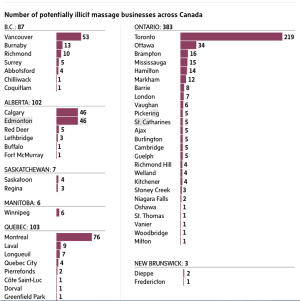Here is the article. Information also on if you suspect some is being sex trafficed.
Sex trafficking is one of the toughest crimes to investigate. But now, new groundbreaking methods are exposing criminal hot spots across Canada long hidden from view.
According to a new data analysis by Thomson Reuters Special Services, LLC, transnational criminals who reap billions of dollars in sordid profits appear to be operating at hundreds of illicit massage parlours in the country.
TRSS, a subsidiary of Thomson Reuters Corp., identified 700 such businesses as part of their Canadian case study. The company uses data and technology to help law enforcement and government agencies identify and nab criminals involved in human trafficking – a complex crime that involves the recruitment, transport and control of vulnerable individuals.
(Woodbridge Co. Ltd., the Thomson family holding company and controlling shareholder of Thomson Reuters, also owns The Globe and Mail.)
TRSS’s findings – which were shared exclusively with The Globe and will be provided to law enforcement agencies across Canada this week – were based in part on an in-depth assessment of data scraped from online review boards used by men to find Canadian businesses that provide “happy ending” sexual services.
Various police agencies are expected to use the TRSS research to launch new sex-trafficking investigations or augment their existing probes.
The case study’s preliminary findings, however, indicate that criminals who exploit susceptible women and girls are also using Canadian shell corporations to wash the proceeds of their crimes.
That long-standing money-laundering technique is effective because there are millions of these private companies and no public information about their owners – underscoring why economic-crime experts are urging Ottawa and the provinces to move quickly to create a comprehensive corporate registry covering all of Canada.
Without it, law enforcement will continue to have limited information to investigate these crimes. “There’s so much money that’s being made in the informal or shadow economy that we are just barely scratching the surface,” said Heather Fischer, senior adviser for human rights crimes at TRSS, who previously served as the White House special adviser for human trafficking.
It is estimated that illicit massage businesses in Canada and the United States together generate proceeds of roughly US$2.5-billion a year, she said.
Heather Fischer is senior advisor for human rights crimes at Thomson Reuters Special Services.
Now a widely-predicted recession could give those criminal enterprises a boost.
A 2022 report by the World Bank and the International Organization for Migration includes an analysis that shows how economic shocks lead to higher unemployment, which in turn, puts increased “pressure on individuals and households to pursue riskier livelihoods and survival strategies” to find new income.
“The risk of this increasing and growing in a recessionary environment is much more profound than we probably can even imagine,” said Stuart Davis, executive vice-president, financial crimes risk management and group chief anti-money laundering officer at the Bank of Nova Scotia.
As economic challenges deepen, people face dire situations as they struggle to pay their bills and homelessness increases, he added.
“Many of the people who are being exploited actually have kids, so they’re looking to take care of their families,” Mr. Davis said.
“I think we often forget the children that are impacted in this and they themselves become targets for exploitation.”
Number of potentially illicit massage
(Graph was inserted here)
The 700 suspected illicit massage parlours identified by TRSS – their list includes both licensed and unlicensed businesses – were found in every province except Nova Scotia and Prince Edward Island.
Although many establishments were located in major metropolises such as Toronto, Montreal and Vancouver, others were pinpointed in smaller cities – places like Chilliwack, B.C., St. Thomas, Ont., and Dieppe, N.B.
Additionally, TRSS identified 41 individuals – or possible owners – associated with those businesses.
Sex traffickers who register their businesses do so to create the illusion of commercial legitimacy as they sell sex.
Moreover, some proprietors own more than one establishment.
“These are not just stand-alone strip mall entities,” said Derek Benner, managing director of federal law enforcement and commercial programs at TRSS. “These are globally-connected enterprises like a cartel.”
TRSS's Derek Benner describes how sex traffickers can operate across borders 'like a cartel.'
As part of TRSS’s efforts to identify possible shell companies used by sex traffickers, it found the majority were incorporated at the provincial level.
The company’s data scientists also ran their list of Canadian businesses through the International Consortium of Investigative Journalists Offshore Leaks Database. That data bank includes more than 810,000 offshore entities named in five separate investigations, the best known of which is the Panama Papers.
Out of the 700 Canadian companies identified by the TRSS investigation, there were nine matches, showing the international scope of some of the operations and the lucrative nature of transnational crime.
“Victims are moved around the country and across borders on a regular basis,” explained Mr. Benner, who previously worked as an executive associate director for Homeland Security Investigations, which is responsible for rooting out transnational and terrorist criminal organizations. “That’s a known phenomenon within sex trafficking in particular, especially around big events, big sporting events, big conventions or just as a matter of business.”
TRSS commenced its Canadian investigation after spending more than five years working with U.S. police to identify and shut down illicit massage parlours in the United States. While doing so, it found that most of those U.S. establishments are part of organized crime networks that include at least one other illicit massage business.
Victims are generally rotated between the businesses every two to six weeks, which also helps traffickers avoid detection by law enforcement. Their traffickers are usually people they know – such as relatives, partners or friends – who use a mix of fraud and coercion to maintain control.
According to Ms. Fischer, many of the women – especially those from China and Korea – don’t speak English, which further complicates their ability to escape the situation. “They were promised a legitimate job here in the U.S. or Canada. And somebody came and picked them up from Flushing, New York, and brought them across the border or brought them to Anytown, USA or Anytown, Canada, to be exploited.”
Relationship of human-trafficking victims to their traffickers, Canada 2010-2020
(Graph inserted here)
Sex traffickers, much like other criminals, often engage in money laundering to misrepresent the source of their funds, which also snarls efforts to detect their illicit activity.
One common technique involves the misuse of Canadian shell corporations to create a false appearance that criminal proceeds were derived from legitimate business sources. A shell corporation is a business that exists purely on paper because it lacks operations. Although shell companies can be established for valid purposes, such as to serve as takeover vehicles or to raise financing, these corporate entities are also a favourite tool of money launderers because they are vulnerable to abuse.
That’s because shell corporations are easy to set up, including from outside of Canada. Empty shells can be used to temporarily park funds and to gain access to the financial system – allowing illicit profits to eventually flow out of the country, including via wire transfers and other banking transactions.
In addition to the lack of public information about who ultimately owns and controls these private corporations, criminals are able to further evade capture by concocting elaborate ownership structures that span different countries and use nominee directors, according to a separate report published by Transparency International Canada, a non-governmental anti-corruption organization.
“The more you layer, the more difficult it can become to trace back the source of the funds,” explains Vanessa Iafolla, principal at Anti-Fraud Intelligence Consulting who focuses on money laundering and human trafficking.
Different types of corporate entities can be used as shells. Limited partnerships, for instance, are a type of business structure that is especially appealing to financial criminals because they can be used to open bank accounts, facilitate business transactions, are subject to fewer financial reporting requirements, and may not necessarily pay Canadian taxes, the Transparency International report said.
Canada has been under pressure for years from key allies, including the United States, to crack down on financial crime.
As a result, Ottawa plans to create a publicly-accessible corporate beneficial ownership registry to reveal who owns and controls millions of private companies.
But critics say there’s a key weakness because the provinces have not agreed to participate in that project. The database, which is scheduled to be operational later this year, will only include federally-incorporated companies, even though the vast majority of companies are incorporated in the provinces.
“It’s no secret to criminals that Canada has so many loopholes to exploit,” said James Cohen, Executive Director of Transparency International Canada. “Whether it’s for human trafficking directly in Canada, or to pass the funds of human trafficking elsewhere through Canada, we are a convenient place to do it.”
The absence of readily-available beneficial ownership information for provincial shell corporations will continue to frustrate efforts to combat sex trafficking.
“That is why it is so important that the provinces get behind this and work with the federal government,” added Mr. Cohen.
Transparency International and Publish What You Pay Canada are among the organizations urging provinces to reach an agreement with Ottawa, arguing also that the registry should be free to use and that ownership information must be subject to verification.
For its part, TRSS found that proceeds from illicit massage businesses often make their way back to the criminals’ home countries, such as China, including by way of trade-based money laundering.
That method, which involves falsified shipping documents, fake invoices and mislabelled goods, uses international trade as a cover to clean dirty money and move those funds across borders.
Other techniques employed by criminals include bulk cash smuggling across international borders and illicit money transfers that bypass the banking system entirely. Similar to a “hawala” or an informal IOU system, money value is transferred from business to business in China’s underground economy with no movement of funds through financial institutions, Mr. Benner said.
“They’re getting more complicated and sophisticated,” he added. “Those same methodologies that we’re familiar with in money laundering for narcotics and other crimes are used extensively by criminal organizations engaged in human trafficking and exploitation.”
The Canadian government does not have a reliable estimate for the prevalence of human trafficking, partly because it is difficult to detect and victims are scared to ask for help. But research does indicate that sexual exploitation (rather than forced labour) is the most common form of human trafficking.
Existing police-reported data gathered by Statistics Canada shows a sharp increase in incidents of human trafficking over the past 10 years, but they also indicate the COVID-19 pandemic has caused a levelling off since 2020.
The federal agency estimates there were 488 police-reported incidents of human trafficking in 2022. Although the final count for last year will be released later this year, that preliminary figure compares to 552 incidents in 2021 and 553 in 2020. (Of course, since this type of crime is under-reported, this is most likely just a fraction of the total number.)
“With people isolating and spending more time at home, away from public view, the police’s ability to detect this type of crime could have been impacted,” Statscan wrote in a report published this past December.
Criminals may have also switched tactics during the pandemic.
“If you think about the massage parlours, obviously that was disrupted during COVID. If you look at the sexual exploitation over the internet, that definitely increased,” said Sarah Paquet, director and chief executive officer of the Financial Transactions and Reports Analysis Centre of Canada (FinTRAC).
During the economic lockdowns, traffickers shifted to online platforms to connect with and groom potential victims. They also posted explicit videos to advertise to customers, according to FinTRAC.
Sarah Paquet at FinTRAC says human traffickers adapted to digital platforms during the pandemic, but there are red flags that banks and many other businesses can use to help track criminals' activities.
Although sex trafficking has long been narrowly viewed as a law enforcement issue, it’s much bigger than that. In fact, the perils of this crime also create risks for industries including banking, technology, telecommunications, airlines, trucking, hospitality and health care – and all have a role in solving the problem.
“Trafficking is a crime that we define as hidden in plain sight,” explains Mr. Benner.
As for illicit massage parlours, they are common enough in Canada that FinTRAC flagged the issue in an updated operational alert in 2021. In it, FinTRAC noted 58 indicators for sexual trafficking to help reporting entities, such as banks, spot patterns of criminal activity. For instance, a string of financial transactions for short stays in hotels and motels in multiple cities over a relatively short period of time is one such red flag.
“You will see it in spas, for example, or small hotels or short-term rentals,” Ms. Paquet said.
“We are really looking into criminal organizations. So, if you talk about criminal organizations, they’re not just doing human trafficking. They will do drug trafficking, they will do fraud. So, all those crimes get intertwined,” she added.
Although these criminals often operate with impunity, there has been some movement to tackle this problem in Canada in recent years.
Since tracing illicit money trails is fundamental to stopping traffickers and rescuing survivors, FinTRAC, the federal anti-money laundering watchdog, launched Project Protect in 2016.
Project Protect is the first-ever public-private partnership – between FinTRAC, financial institutions and law enforcement agencies – to combat human trafficking for sexual exploitation. The collaboration involves the sharing of general information about potential red flags for criminal activity.
FinTRAC received thousands of suspicious transaction reports related to Project Protect in 2021-22 alone.
But as the TRSS investigation of the 700 illicit massage parlours demonstrates, police are often unaware of human trafficking in their communities.
Experts say Canada needs additional tools to track down these criminals. Exposing the owners of shell corporations, they say, is a necessary step to trace illicit funds, prosecute traffickers and save lives.
“That’s why beneficial ownership [information] is so important to us,” Ms. Paquet said.
EXCLUSIVE
Sex traffickers are using shell companies to launder illicit profits in Canada
New research sheds light on how hundreds of potentially illicit massage parlours hide their money and the vulnerable people they prey on
RITA TRICHUR
PUBLISHED 8 HOURS AGOUPDATED 7 HOURS AGO
ILLUSTRATION BY CELESTE COLBORNE
LISTEN TO ARTICLE
Resources • Who to call to report sex trafficking in Canada
Sex trafficking is one of the toughest crimes to investigate. But now, new groundbreaking methods are exposing criminal hot spots across Canada long hidden from view.
According to a new data analysis by Thomson Reuters Special Services, LLC, transnational criminals who reap billions of dollars in sordid profits appear to be operating at hundreds of illicit massage parlours in the country.
TRSS, a subsidiary of Thomson Reuters Corp., identified 700 such businesses as part of their Canadian case study. The company uses data and technology to help law enforcement and government agencies identify and nab criminals involved in human trafficking – a complex crime that involves the recruitment, transport and control of vulnerable individuals.
STORY CONTINUES BELOW ADVERTISEMENT
(Woodbridge Co. Ltd., the Thomson family holding company and controlling shareholder of Thomson Reuters, also owns The Globe and Mail.)
TRSS’s findings – which were shared exclusively with The Globe and will be provided to law enforcement agencies across Canada this week – were based in part on an in-depth assessment of data scraped from online review boards used by men to find Canadian businesses that provide “happy ending” sexual services.
Various police agencies are expected to use the TRSS research to launch new sex-trafficking investigations or augment their existing probes.
The case study’s preliminary findings, however, indicate that criminals who exploit susceptible women and girls are also using Canadian shell corporations to wash the proceeds of their crimes.
STORY CONTINUES BELOW ADVERTISEMENT
That long-standing money-laundering technique is effective because there are millions of these private companies and no public information about their owners – underscoring why economic-crime experts are urging Ottawa and the provinces to move quickly to create a comprehensive corporate registry covering all of Canada.
Without it, law enforcement will continue to have limited information to investigate these crimes. “There’s so much money that’s being made in the informal or shadow economy that we are just barely scratching the surface,” said Heather Fischer, senior adviser for human rights crimes at TRSS, who previously served as the White House special adviser for human trafficking.
It is estimated that illicit massage businesses in Canada and the United States together generate proceeds of roughly US$2.5-billion a year, she said.
Heather Fischer is senior advisor for human rights crimes at Thomson Reuters Special Services.DEE DWYER/THE GLOBE AND MAIL
Now a widely-predicted recession could give those criminal enterprises a boost.
STORY CONTINUES BELOW ADVERTISEMENT
A 2022 report by the World Bank and the International Organization for Migration includes an analysis that shows how economic shocks lead to higher unemployment, which in turn, puts increased “pressure on individuals and households to pursue riskier livelihoods and survival strategies” to find new income.
“The risk of this increasing and growing in a recessionary environment is much more profound than we probably can even imagine,” said Stuart Davis, executive vice-president, financial crimes risk management and group chief anti-money laundering officer at the Bank of Nova Scotia.
As economic challenges deepen, people face dire situations as they struggle to pay their bills and homelessness increases, he added.
“Many of the people who are being exploited actually have kids, so they’re looking to take care of their families,” Mr. Davis said.
“I think we often forget the children that are impacted in this and they themselves become targets for exploitation.”
Number of potentially illicit massage
businesses across Canada
B.C.: 87
Vancouver
53
13
Burnaby
10
Richmond
5
Surrey
4
Abbotsford
1
Chilliwack
1
Coquitlam
ALBERTA: 102
Calgary
46
46
Edmonton
5
Red Deer
3
Lethbridge
1
Buffalo
1
Fort McMurray
SASKATCHEWAN: 7
Saskatoon
4
Regina
3
MANITOBA: 6
Winnipeg
6
QUEBEC: 103
Montreal
76
9
Laval
7
Longueuil
4
Quebec City
2
Pierrefonds
1
Côte Saint-Luc
1
Dorval
1
Greenfield Park
1
Laval
1
Westmount
ONTARIO: 383
219
Toronto
34
Ottawa
16
Brampton
15
Mississauga
14
Hamilton
12
Markham
8
Barrie
7
London
6
Vaughan
5
Pickering
5
St. Catharines
5
Ajax
5
Burlington
5
Cambridge
5
Guelph
4
Richmond Hill
4
Welland
4
Kitchener
3
Stoney Creek
2
Niagara Falls
1
Oshawa
1
St. Thomas
1
Vanier
1
Woodbridge
1
Milton
NEW BRUNSWICK: 3
Dieppe
2
1
Fredericton
NEWFOUNDLAND AND LABRADOR: 9
9
St. Johns
Note: Data represented in the above charts are publicly available and collected from open-source websites. The data may include businesses that are closed, inactive, or no longer conducting illicit operations. The data was accessed on Jan. 10, 2023
THE GLOBE AND MAIL, SOURCE:
THOMSON REUTERS SPECIAL SERVICES, LLC
The 700 suspected illicit massage parlours identified by TRSS – their list includes both licensed and unlicensed businesses – were found in every province except Nova Scotia and Prince Edward Island.
Although many establishments were located in major metropolises such as Toronto, Montreal and Vancouver, others were pinpointed in smaller cities – places like Chilliwack, B.C., St. Thomas, Ont., and Dieppe, N.B.
Additionally, TRSS identified 41 individuals – or possible owners – associated with those businesses.
Sex traffickers who register their businesses do so to create the illusion of commercial legitimacy as they sell sex.
STORY CONTINUES BELOW ADVERTISEMENT
Moreover, some proprietors own more than one establishment.
“These are not just stand-alone strip mall entities,” said Derek Benner, managing director of federal law enforcement and commercial programs at TRSS. “These are globally-connected enterprises like a cartel.”
The Canadian government does not have a reliable estimate for the prevalence of human trafficking, partly because it is difficult to detect and victims are scared to ask for help. But research does indicate that sexual exploitation (rather than forced labour) is the most common form of human trafficking.
Existing police-reported data gathered by Statistics Canada shows a sharp increase in incidents of human trafficking over the past 10 years, but they also indicate the COVID-19 pandemic has caused a levelling off since 2020.
The federal agency estimates there were 488 police-reported incidents of human trafficking in 2022. Although the final count for last year will be released later this year, that preliminary figure compares to 552 incidents in 2021 and 553 in 2020. (Of course, since this type of crime is under-reported, this is most likely just a fraction of the total number.)
“With people isolating and spending more time at home, away from public view, the police’s ability to detect this type of crime could have been impacted,” Statscan wrote in a report published this past December.
STORY CONTINUES BELOW ADVERTISEMENT
Criminals may have also switched tactics during the pandemic.
“If you think about the massage parlours, obviously that was disrupted during COVID. If you look at the sexual exploitation over the internet, that definitely increased,” said Sarah Paquet, director and chief executive officer of the Financial Transactions and Reports Analysis Centre of Canada (FinTRAC).
During the economic lockdowns, traffickers shifted to online platforms to connect with and groom potential victims. They also posted explicit videos to advertise to customers, according to FinTRAC.
Sarah Paquet at FinTRAC says human traffickers adapted to digital platforms during the pandemic, but there are red flags that banks and many other businesses can use to help track criminals' activities.ASHLEY FRASER/THE GLOBE AND MAIL
Although sex trafficking has long been narrowly viewed as a law enforcement issue, it’s much bigger than that. In fact, the perils of this crime also create risks for industries including banking, technology, telecommunications, airlines, trucking, hospitality and health care – and all have a role in solving the problem.
“Trafficking is a crime that we define as hidden in plain sight,” explains Mr. Benner.
STORY CONTINUES BELOW ADVERTISEMENT
As for illicit massage parlours, they are common enough in Canada that FinTRAC flagged the issue in an updated operational alert in 2021. In it, FinTRAC noted 58 indicators for sexual trafficking to help reporting entities, such as banks, spot patterns of criminal activity. For instance, a string of financial transactions for short stays in hotels and motels in multiple cities over a relatively short period of time is one such red flag.
“You will see it in spas, for example, or small hotels or short-term rentals,” Ms. Paquet said.
“We are really looking into criminal organizations. So, if you talk about criminal organizations, they’re not just doing human trafficking. They will do drug trafficking, they will do fraud. So, all those crimes get intertwined,” she added.
Although these criminals often operate with impunity, there has been some movement to tackle this problem in Canada in recent years.
Since tracing illicit money trails is fundamental to stopping traffickers and rescuing survivors, FinTRAC, the federal anti-money laundering watchdog, launched Project Protect in 2016.
STORY CONTINUES BELOW ADVERTISEMENT
Project Protect is the first-ever public-private partnership – between FinTRAC, financial institutions and law enforcement agencies – to combat human trafficking for sexual exploitation. The collaboration involves the sharing of general information about potential red flags for criminal activity.
FinTRAC received thousands of suspicious transaction reports related to Project Protect in 2021-22 alone.
But as the TRSS investigation of the 700 illicit massage parlours demonstrates, police are often unaware of human trafficking in their communities.
Experts say Canada needs additional tools to track down these criminals. Exposing the owners of shell corporations, they say, is a necessary step to trace illicit funds, prosecute traffickers and save lives.
“That’s why beneficial ownership [information] is so important to us,” Ms. Paquet said.
STORY CONTINUES BELOW ADVERTISEMENT
Who to call to report sex trafficking in Canada
• If you spot someone in danger, call 911 or your local police.
• If you are a survivor of human trafficking, or suspect that someone else might need assistance, call the Canadian Human Trafficking Hotline at 1-833-900-1010. It operates 24 hours a day, seven days a week.
• Members of the public can anonymously report a case of human trafficking to the Crime Stoppers Association National Tipline at 1-800-222-TIPS(8477).
• Canadians can also disclose their suspicions about money laundering to FinTRAC on its online portal.
• Consult the Victim Services Directory to locate resources available to survivors across Canada.
































































































